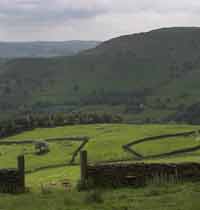Hill farmers may be worst hit by CAP reform

England’s hill farmers will find it difficult to adapt to reform of the Common Agricultural Policy, experts have warned.
Upland farm businesses will continue to decline in number unless Brussels properly thinks through plans to “green” the CAP by increasing money for agri-environment schemes at the expense of the single farm payment.
The study was produced for DEFRA by a team of experts from the Countryside and Community Research Institute at Gloucestershire University and the Food and Environment Research Agency.
“The single farm payment really does underpin most commercial upland businesses,” said Peter Gaskell, who led the research team. “Their profit is the single farm payment.”
Greening the CAP was a worthy goal, suggested Dr Gaskell. But it was vital that any policy change looked after core agricultural enterprises, including upland sheep and beef suckler herds, he warned.
The study comes just weeks before Brussels formally publishes its CAP reform proposals. It follows a DEFRA survey which found that one in five hill farmers do not expect their business to continue beyond the next five years.
Researchers examined various CAP reform scenarios, conducting 83 face-to-face farmer interviews and undertaking 16 environmental case studies to examine the potential impact of a change in farming policies.
More than a quarter of uplands farms have no recorded successor, said Dr Gaskell. “When we asked farmers what they thought the future held for the uplands, their overall response was one of resigned pessimism.”
Abolishing the single payment would be unthinkable for many upland farmers. But even directing more money towards environmental schemes threatened to have devastating consequences for upland communities and the environment.
“Phasing out the single payment will not give the best environmental benefits,” said Dr Gaskell. “The uplands need to be properly managed. Bolstering environmental support sounds great, but you have to look at the whole package.
“Sustainable upland farming is not a pipedream – it is achievable. Getting the right policies will be a challenge, but success will help ensure a brighter future for upland communities. Get it wrong and they could disappear quickly.”
